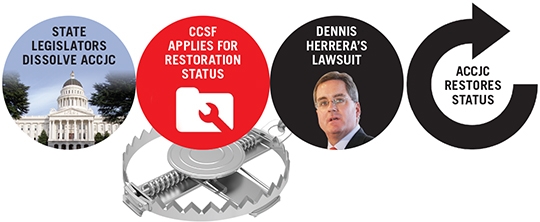As City College of San Francisco struggles to loosen the noose around its neck, this week its accreditors are slated to offer the college a new way out. But some skeptics are sounding the alarm: it’s a trap.
The Accrediting Commission of Community and Junior Colleges is scheduled to vote on and announce a newly revised version of its “restoration policy,” which some journalists have called City College’s salvation.
“Huge CCSF Win: College Won’t Close,” one San Francisco Chronicle headline read. Bay Area TV stations and others echoed the jubilant headline, saying City College was saved. Chancellor Art Tyler told the Chronicle he would “absolutely” apply for restoration status. But many are calling the restoration policy a poor choice for the college’s future.
“Rumors of City College being saved are premature,” Alisa Messer, political director for the American Federation of Teachers Local 2121, told us.
The college’s faculty union isn’t the only one worried. A report released this month by the California State Auditor shows ACCJC has operated against its own bylaws and without full transparency in threatening CCSF’s accreditation.
“To allow community colleges flexibility in choosing an accreditor,” the state auditor’s report wrote, “the chancellor’s office should remove language from its regulations naming the commission as the sole accreditor of California community colleges while maintaining the requirement that community colleges be accredited.”
In the staid and stuffy bureaucratic language, the auditor essentially wrote the accreditor group was so dysfunctional it should be closed. The 75-plus page report scathingly tears down ACCJC staff, board selection, decisions, and policies. There are few areas in which they did not find fault.
“The report draws conclusions about accreditation without the necessary context and facts related to institutional evaluations,” ACCJC President Barbara Beno told the Guardian via email. “ACCJC is reviewed and approved by the United States Department of Education and its recognition was renewed in January 2014. That is the appropriate body to review the ACCJC’s practices.”
The DOE found many faults with the accreditors as well, but the scope of its review was limited to complaints made by the unions. The auditor viewed the accreditors in a fuller context, alleging the ACCJC decided to terminate CCSF’s accreditation “after allowing only one year to come into compliance,” while simultaneously allowing 15 other colleges two years and another six institutions to up to five years to reach compliance.
Such accusations of bias are also alleged in City Attorney Dennis Herrera’s lawsuit against ACCJC, charging CCSF was targeted with harsher penalties due to its political views.
Meanwhile, a closer look at restoration status shows it’s less like a lifeline and more like a tightrope suspended over flames.
The policy would give CCSF two years to come into compliance with all of the so-called “defects” ACCJC identified. If the college addresses these issues in two years, the commission would rescind the notice to terminate the college’s accreditation.
But buried in the legalese is a frightening clause noting that if CCSF isn’t found to comply with everything, “the termination implementation will be reactivated and the effective date will be immediate,” with “no further right to request a review or appeal in this matter.”
Beno said she heard the college community’s concerns around these clauses, during a two-week public comment period regarding the proposed policy that ended June 25.
“The Commission received a good deal of feedback,” she wrote, saying a revised “final version” of the restoration policy has been sent to the commissioners, who will vote remotely over the next week. “If it is approved, the ACCJC will post the final policy on its web page, the policy will be effective immediately.”
But the auditor found Beno hasn’t followed existing bylaws. This has long been an open secret in the community college world that’s referenced to in a 2010 public letter from the former California Community College Chancellor Jack Scott to the Department of Education. His immediate successor, Brice Harris (who also served on the ACCJC as a commissioner for seven years), did not heed this knowledge. He trusted Beno.
He met her for coffee, he talked to her on the phone. These interactions led him to believe replacing the college’s leadership would appease Beno, he said in his declaration (under penalty of perjury) in Herrera’s lawsuit against the ACCJC.
So on July 3, 2013, Harris released a video announcing he stripped the college’s elected Board of Trustees of all of its powers and promoted Special Trustee Bob Agrella to take its place. The college community was in an uproar, but Harris maintained publicly it was the right thing to do.
Privately, he received an email from Beno. “Dear Brice, Beautiful job,” she wrote to him, about his decision to whack the board. “The college may survive, with the right leadership.”
Harris wrote in his declaration: “Based on this email, which was consistent with all my prior interactions with Dr. Beno, I believed that City College could maintain its accreditation… if City College took extraordinary steps to comply with the ACCJC’s recommendations.”
But the accreditors did just the opposite. Just this month, it denied CCSF’s accreditation appeal, telling the college they it not review any evidence of progress it made after they voted to terminate its accreditation. This took Harris by surprise.
“If I had known on July 8, 2013, that the rules of the commission were later going to be interpreted to preclude any progress made by City College after June 2013,” he wrote in his declaration, “I would not have asked the Board of Governors to take the extraordinary step of setting aside the locally elected Board of Trustees.”
Harris was burned by the ACCJC. Now City College faces the choice to trust Beno and the accreditors again.
Above, California Community Colleges Chancellor Brice Harris explains why he pushed state entities to remove the City College’s Board of Trustees and replace them with Special Trustee Bob Agrella. Should City College of San Francisco trust the ACCJC?

